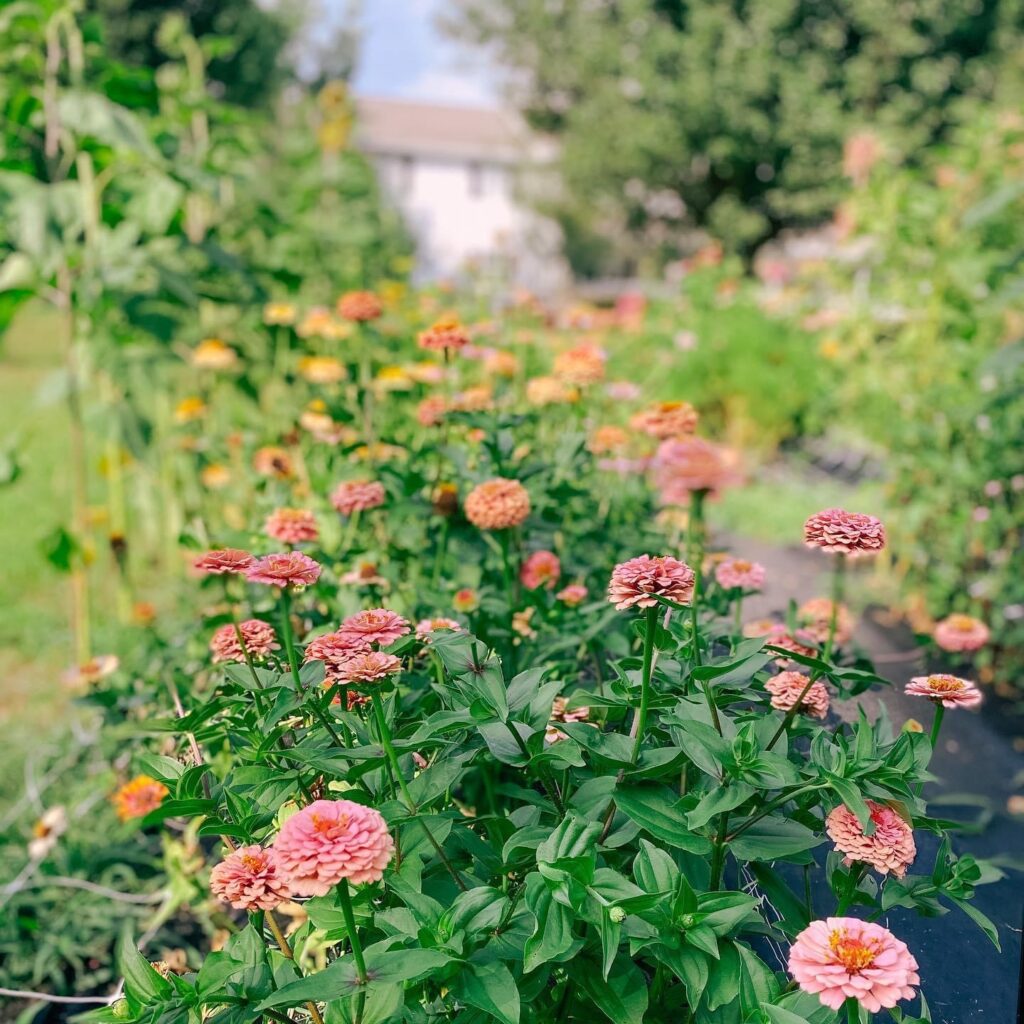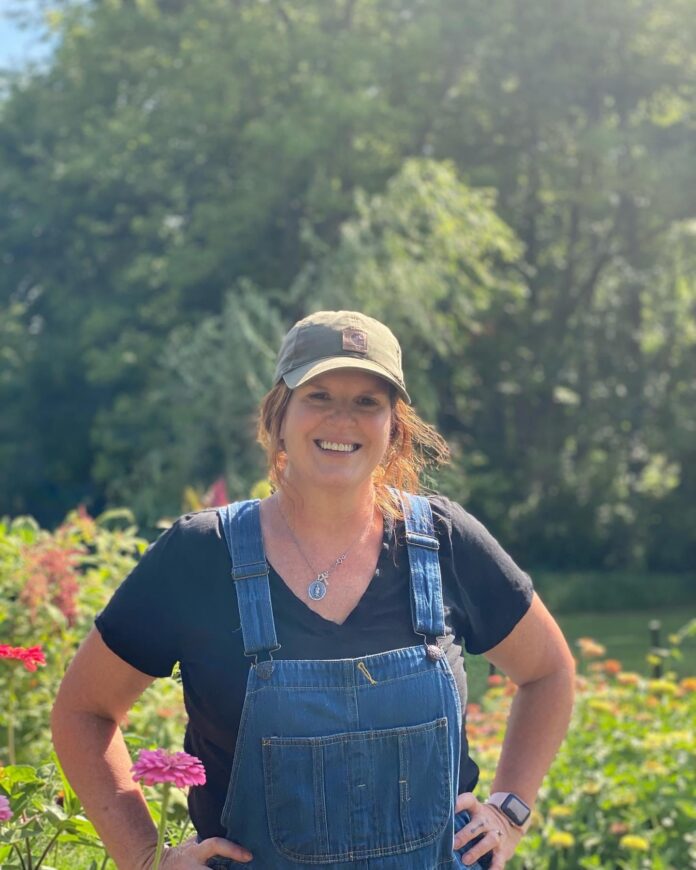Herbalist and gardener Amelia Gilliland recently began what she calls her “encore career” at her farm Marigold Moon, which she started last year at her home.
After retiring from a 25-year career as a professor in 2020, Gilliland began formal study of herbalism through the American Herbalists Guild she will complete in 2023. Before pursuing a Ph.D. in education, she began studying herbalism and naturopathy informally. She has been using herbs for decades and her knowledge of herbalism was extensive even before she began formal studies. She has studied with many well-known herbalists, including Juliet Blankespoor, Matthew Wood, Alabama’s own Phyllis Light, Maria Noel Groves and Rosemary Gladstar.
Gilliland said her move toward homesteading was a gradual transition.
“I grew up in a family that always had a garden, and my mother was very involved in our communities’ garden club, so I attribute my interest to my parents. I’ve homeschooled my children for seven years now, and homeschooling allows for more time to learn in experiential ways and engage in more activities like homesteading,” she said. “We got our start with a small flock of chickens. We learned a lot during the first year and were hooked on fresh eggs.”
Gilliland has kept up the tradition set by her parents, and always grown a small garden with her family, but this summer is the first time they have ramped up their efforts. This year is only Gilliland’s second summer in Cullman. She began with a small garden to get to know the land and see what grows in it. She said she was thrilled to discover she could grow a lot of plants that are used medicinally, including elder, goldenrod, chickweed, violets, yarrow, ginkgo, hibiscus and dandelions. The farm also has apple and peach trees and a blueberry bush.
This summer she expanded her vegetable garden to six raised beds and a 2,500-square-foot in-ground garden. Next year a high tunnel will be added to the farm to further expand the garden and lengthen the growing season.
“I deeply value knowing where my food is grown and how it was grown to ensure we eat the healthiest and most vibrant fruits and vegetables,” said Gilliland.
Last year, her family grew a small cut flower garden that also expanded this summer to 2,500 square feet.

“Our cut flower garden is a growing ministry for my daughter and me,” she said. “We aren’t interested in selling the flowers, but next summer, we plan to make flower deliveries to residents in nursing homes or people who would otherwise not receive flowers. We’ve named our flower ministry Happy Petals, and we are in the beginning stages of this exciting project.”
Gilliland’s herb garden expanded greatly in terms of diversity this year. She said she favors plants that can be used medicinally for health and wellness.
“We brought in some wetland medicinals, including skullcap, gotu kola and stinging nettle. We grow a variety of common herbs that my family uses. These include chamomile, calendula, bee balm, echinacea, clary sage, white sage, California poppy, tulsi, rhodiola, wild yam, angelica, yarrow, mugwort, mullein, valerian, lemon balm, ginkgo and anise hyssop,” she said. “This year, I have very young plants in the greenhouse, including passionflower, meadowsweet, motherwort, feverfew, wooly lamb’s ear, St. John’s wort and lavender.”
As Gilliland expands her materia medica and working knowledge of medicinal herbs, she brings more and more plants into her garden. Her go-to herbs include calendula, lemon balm, tulsi, echinacea, elder, ginkgo and goldenrod. She said calendula is a fantastic herb for skin conditions. Calendula can also be used internally and for salves, soaps and infused oils. Goldenrod, which grows in abundance in Alabama, is her go-to herb for sinus problems. Her family also uses ginkgo in a brain health formula daily.

Said Gilliland, “As an herbalist, I sell organic herbs grown here, organic extracts, teas and skin care products. These include a brain health formula, a formula for cramps and a formula for ADHD that has been the biggest blessing. I was able to transition my son off medication for ADHD and have him on an herbal formula that manages the extra energy and helps him to focus.”
She said there are a few things to be aware of when dealing with herbs, but they are generally safe.
“Herbs have been used safely for centuries for varying medical issues. There have been so many cultures that led the way in this field, and I am grateful to learn from them,” said Gilliland. “This includes knowledge of poisonous plants, like poisonous hemlock, which looks very similar to Queen Anne’s lace and yarrow, so knowing how to identify plants is essential.”
She said when using an herb, people must make sure they don’t have an allergy to that plant or plant family. Additionally, it’s essential to understand if someone is taking prescription medications and how they may interact with a specific herb. It is important to always check with your physician before starting a new herbal supplement.
“I do encourage people to shop for their herbs from a reliable source. You can walk into just about any store and find an array of herbal supplements, but the quality of the herbs may be questionable,” said Gilliland. “Herbs have a shelf life and will eventually lose their vitality over time. Shopping from a source that provides a high-quality product is critical.”
For those who wish to get started planting their own medicinal herbs, Gilliland said there are a few options. “I recommend doing your due diligence in researching which school to attend and understanding your overall goal. Some people want to learn herbal medicine for their health or their family’s health. There are shorter programs for these goals. The American Herbalists Guild has a directory of schools that offer classes that they recognize as academic hours that count toward becoming a registered herbalist for those interested in pursuing herbalism as a career.”
Gilliland will be putting her years of experience in higher education to use by offering her own introductory courses in herbalism, planned to launch this fall. She said her goal is to provide online learning as well as in-person classes. In addition to herbalism classes, she also offers professional services to clients as a part of a holistic health approach. To address the whole person, Gilliland offers life coaching, herbal consults and prescriptive yoga depending on the individual’s needs.
Marigold Moon products and services can be found at www.marigold-moon.com, www.instagram.com/the.marigold.moon, www.facebook.com/Marigold-Moon-108409838149023 and www.etsy.com/shop/MarigoldMoonbotanics.
Contact Gilliland at Amelia@marigold-moon.com.
Copyright 2022 Humble Roots, LLC. All Rights Reserved.




















